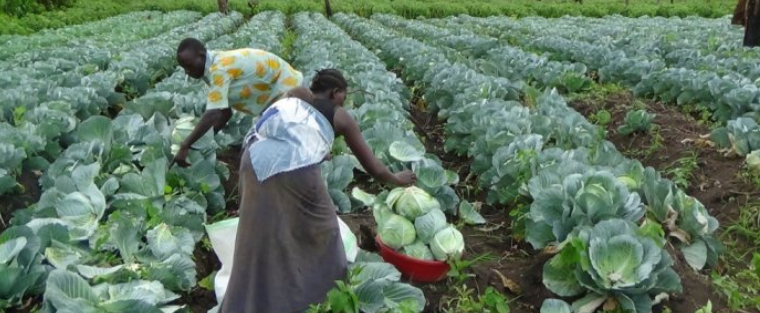Hundreds of farmers hailing from the verdant green belt region of Yei gathered on Tuesday at the Yei Freedom Square to exhibit their agricultural yields for the current year. Despite being recognized as the food basket of South Sudan, Yei has faced challenges due to conflicts, resulting in only 40 percent of the farmers being able to supply markets both locally and beyond.
John Kenyi, the Monitoring and Evaluation Officer for Rural Women for Development South Sudan in the Resilient Agricultural Livelihood Project, spoke with Radio Tamazuj about the purpose of the trade show. He emphasized that it aims to showcase Yei’s potential and its capacity to sustain the entire country if given the opportunity for peace.
Kenyi stated, “This trade show is organized to reveal the untapped potential of Yei. Currently, not all aspects are on display, but we aim to highlight what Yei has to offer. Yei possesses the capability to significantly contribute to South Sudan’s food supply if provided with peace. The fertile land and industrious farmers in Yei are indicative of its ability to feed the entire nation. The growing population of farmers attests to this potential. While we are yet to reach the harvest period, the available produce is already evident, demonstrating what Yei has to offer this year.”
Kenyi further highlighted that, despite the conflicts disrupting farmers’ activities, efforts are underway to revitalize agricultural pursuits in the region. Yei, situated within the greenbelt, boasts fertile soils conducive to productive farming, essential for combating food insecurity.
“Yei, located within the greenbelt, features some of the most fertile soil in this region. Every crop planted yields abundantly. Although past conflicts impacted Yei’s farmers, they are now working to regain momentum. The showcase today reflects their resilience. Many farmers couldn’t participate due to the upcoming second harvest, explaining the lower turnout. Overall, this year’s produce is promising, and our aim is to restore Yei as the food basket of South Sudan,” emphasized Kenyi.
Kenyi stressed the importance of stabilizing security and addressing pest issues for farmers to boost food production. Insecurity prevents some farmers from accessing their lands, and certain weeds hinder crop growth. Kenyi acknowledged ongoing efforts to help farmers combat these challenges, emphasizing the need for resilience.
“One major challenge these farmers face is insecurity, preventing access to farmlands. Additionally, weeds are affecting crop growth, and we are working on solutions. Despite severe challenges, as we approach harvest time, excessive rains are hindering the process. Farmers need to be resilient. By focusing on cultivation and production, we can reduce reliance on imported food, subsequently lowering market prices,” explained Kenyi.
Meta Batali William, a farmer from the Elephant Agriculture Farming Group specializing in tree planting, cassava, maize, beans, and coffee cultivation, expressed that the trade show serves as a platform for farmers to connect with markets and attract investors to the country’s agriculture sector.
“For us farmers, today’s event provides an opportunity to secure better markets for our surplus products. We have well-processed coffee ready for export and a protein replacement supplement aimed at combating climate change. It’s a newly discovered seed serving as a food substitute in case of scarcity due to climate change, allowing us to sustain ourselves,” said Batali.
However, Batali highlighted challenges faced by farmers, including poor road connections hindering farm accessibility and the prevalence of pests and diseases affecting agriculture in the region.
“We encounter several challenges, such as transportation issues and difficulty accessing markets due to poor roads, even within Yei. Despite having a surplus of produce, our capacity to transport it is limited. Climate change poses another challenge, with abnormal rainfall and floods leading to the emergence of pests and diseases. Lastly, the infrastructure faces challenges, as bridges connecting farmers to markets have been washed away by rains, complicating coordination,” Batali added.
Meanwhile, Makele Patrick, a farmer from the “More Bongo Farmers Group” in Yari Boma, Yei River County, emphasized their commitment to fighting food insecurity in the area by participating in the trade show. He highlighted that their goal is to showcase progress to donor partners, including products like beans, green peppers, onions, maize, and millet. The intention is to demonstrate advancements in agricultural activities under the supervision of donors and project implementation. Makele expressed confidence that, should they require support, the donors would respond promptly.
Makele revealed, “There are numerous challenges we face in the fields. Support from partners and the government for tractors is crucial, as human labour has become tiresome. With much of my produce destroyed by rain, sending my children to school this term has become difficult.”
Jackline Sitima, a mother of eight, urged partners to provide farmers with tractors, citing the challenges posed by relying on manual labour. She emphasized that the increased difficulty, especially for women, coupled with rain damage to her crops, has made it challenging to send her children to school this term.
Farmers in the greenbelt region, particularly in Greater Yei, seek a secure agricultural environment, especially since the area was significantly affected by the 2016 crises in the country.
According to the Food and Agriculture Organization (FAO) assessment on South Sudan, over 3 million people, or 17 percent of the population, are in moderate acute food insecurity—a nearly 40 percent decrease from June/July last year. Approximately 10,000 people are severely food-insecure, down from 66,000 people last year.
To contact Radio Tamazuj with comments, news tips or information, write to radiotamazuj@gmail.com or use the contact form.




